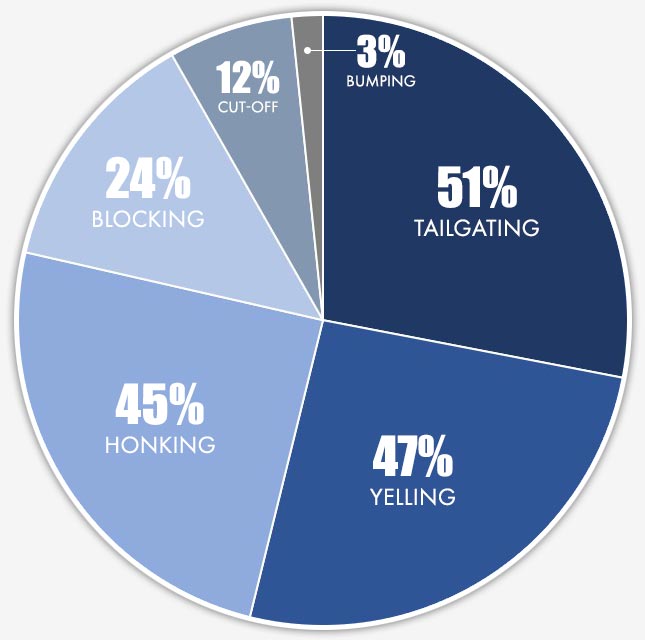What is Aggressive Driving?
There are many dangerous driving practices that make our roads less safe for everyone, but among the deadliest is aggressive driving. Aggressive drivers seem to have little concern for the well-being of others; they only care about getting to their destinations as quickly as possible and putting other drivers in danger.
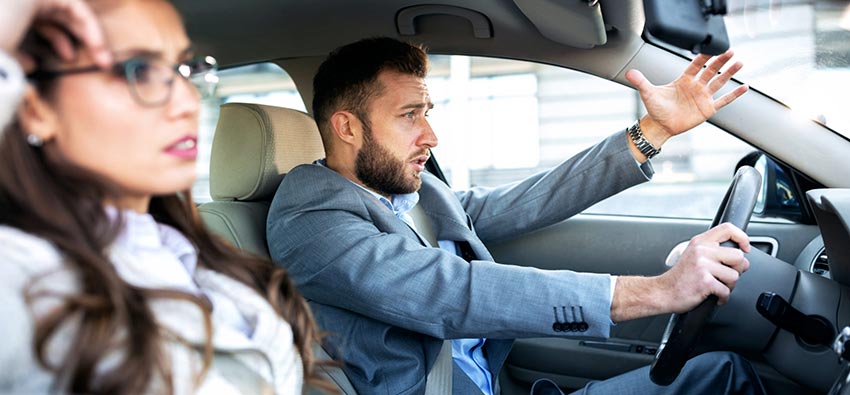
Aggression behind the wheel can lead to serious injury and in some circumstances overwhelming loss. If you or someone you know has been injured in a car accident caused by an aggressive driver, you need a trusted Texas car accident attorney from Miller Weisbrod Olesky, who knows how to handle these complicated claims.
Car Accident Lawyers
888-987-0005At Miller Weisbrod Olesky, our car accident lawyers are committed to exploring all legal remedies available to our clients and aggressively fighting for the compensation they deserve.
Our team of car accident attorneys is led by Clay Miller, a Board-Certified Personal Injury Trial Law Specialist. Due to the rigorous jury trial and testing requirements, this is a distinction achieved by less than 2% of all Texas attorneys.
Our firm has a history of achieving successful verdicts and settlements for all kinds of motor vehicle accidents. We offer free case evaluations to all prospective clients and NEVER charge attorneys’ fees or costs unless/until we secure a favorable settlement or verdict on your behalf.
How Common is Aggressive Driving?
Aggressive driving is generally defined as intentional, unsafe driving with a disregard for safety or even ill intent that puts other people at risk of harm. While it can involve many different behaviors, the National Highway and Traffic Safety Administration (NHTSA) identifies excessive speeding as a hallmark of aggressive driving.
Some behaviors distract other drivers, while other conduct escalates to highly dangerous road rage.

Excessive Speeding
When a motorist chooses to speed excessively, the following results:
- They increase the distance they need to come to a safe stop.
- They greatly increase the risk that they will lose control of their vehicle.
- They increase the reaction time needed to respond safely to a sudden risk factor, such as an accident ahead or roads that become slippery.
- They increase the risk that they’ll cause an accident and that it will be deadly.
- Their vehicle protection equipment, such as seatbelts and airbags, becomes less effective.
NHTSA shares the following alarming statistics related to excess speed:
- For more than 20 years, speed has been a major contributing factor in about a third of all traffic fatalities throughout the nation.
- In 2022 alone, 12,151 people lost their lives in speed-related traffic accidents.
It’s important to point out that motorists can speed even when they don’t exceed the posted speed limit. Every driver is responsible for safely modifying their speed in relation to the road’s condition and the effects of bad weather, debris on the road, poor lighting, low visibility, and any other risk factors.
Tailgating
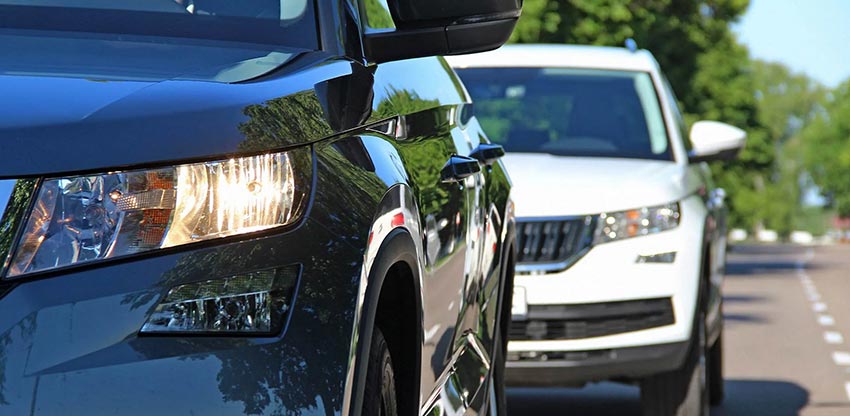
Tailgating is another highly dangerous type of aggressive driving. Following too closely regularly results in a rear-end collision, often at high speeds on Interstate highways. The front driver might even brake check the tailgating driver, which makes determining liability in the resulting accident highly complicated.
Other Signs of Aggression
In addition to speeding and tailgating, other tell-tale signs of aggressive driving include:
- Cutting other drivers off
- Ignoring traffic signs, lights, or signals
- Weaving dangerously in and out of traffic
- Using one’s headlights or brakes in a punishing manner
- Passing on the right – or even on the shoulder
- Changing lanes without signaling and without checking to ensure it is safe to proceed
- Physically blocking other motorists from changing lanes or from passing
Drivers can often get creative when they are impatient, frustrated, angry, or simply having a bad day. No matter what aggressive conduct they choose, it can lead to serious crashes and injuries. Make sure you are not victimized again by the aggressive driver in the aftermath of the collision. Seek an advocate in a Texas car accident lawyer.
Staying Safe on Texas Roadways

If the situation spirals to the point that an aggressive driver attempts to engage you, the Texas Department of Transportation offers the following advice, which applies whenever you get behind the wheel:
- Allow the aggressive driver all the room on the road that you possibly can.
- Avoid making eye contact with them.
- Use the passing lane – or the left lane – only for passing.
- Use your horn sparingly and only when it’s needed for safety purposes.
- Stay calm, don’t let your own emotions get the best of you, and avoid further provocation of the other driver.
- Don’t tailgate or flash your lights behind the aggressive driver.
- Don’t yell obscenities – or anything else – at the other driver, don’t respond to their provocations, and don’t gesture at them menacingly.
- If you have serious concerns about your own safety or about the safety of someone else on the road, alert the authorities by calling 911.
Because aggressive driving can escalate quickly, erring on the side of caution is always advised.
When Aggressive Driving Crosses into Road Rage
Aggressive driving crosses the line into road rage when a motorist engages in extreme acts of aggression like the following:
- Making verbal threats, threatening gestures, or both
- Throwing objects onto the road or at another driver
- Sideswiping, ramming, or tapping another driver’s vehicle
- Physically forcing another driver off the road
Road rage cases have spiked over the last decade in Texas. Further, over the course of about the last 10 years, the number of road rage incidents in the state went from 960 to 1,661, which is an increase of nearly 75 percent.
- 51 percent (104 million drivers) reported intentional tailgating
- 47 percent (96 million drivers) reported yelling at other drivers
- 45 percent (91 million drivers) reported honking unnecessarily out of frustration or anger
- 24 percent (49 million drivers) blocked others from changing lanes
- 12 percent (25 million drivers) intentionally cut off another driver
- 3 percent (6 million drivers) intentionally bumped or rammed another vehicle
Four Causes of Road Rage
Road rage is an emotional response to someone else’s reckless driving; emotions escalate when you feel the need to take physical action as retaliation. Predicting what will provoke an individual is almost impossible. However, the following are common causes of road rage:
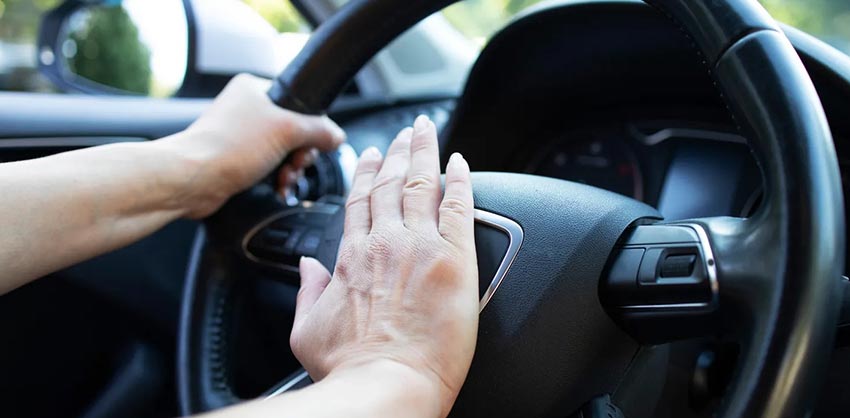
- Congested Streets: Being stuck in traffic is enough to frustrate anyone, but someone who is chronically impatient could find even minor irritations too much to handle.
- Anonymity: Some see driving like being on the internet in that you can meet someone and then never see them again. This can boost a motorist’s confidence, and they become less inhibited about driving aggressively, including honking, gesturing, and cutting other drivers off.
- Accidents were Caused by Distracted Drivers: Seeing a careless motorist swerve, accidentally cut you off, or otherwise drive erratically can be unnerving, and is natural to feel resentment toward them. It’s best not to confront them, both for your safety and the safety of others.
- Impatience: Impatient motorists are more prone to drive recklessly because they consider their schedules more critical than other surrounding drivers.
Avoid Actions that Provoke Road Rage
Whether or not they have reason to be, you might experience road rage at the hands of another motorists. The other driver may be experiencing road rage because they cannot pass you, blowing their horns, flashing their lights, and acting violently. Avoid the following actions to help prevent road rage drivers even further:
- Avoid Tailgating: Give other drivers room on the road. Leave at least a two-second cushion between vehicles to provide enough room to stop in an emergency and to give other drivers room to change lanes.
- Never Drive in the Passing Lane: The left lane of multi-lane roadways is the passing lane for use when passing another vehicle. After passing a vehicle, move back into a driving lane (right lane) when both headlights of the passed vehicle are visible in the rear view mirror.
- Let Drivers Pass: Avoid obstructing the flow of traffic even when going the speed limit. Always allow faster traffic to pass. Never challenge an aggressive driver by speeding up, slowing down, or attempting to hold the same position.
- Use Turn Signals Appropriately: Use turn signals when merging, changing lanes, or turning. Check blind spots before merging or switching lanes to ensure other drivers are not cut off.
- Do Not Speed: Speeding increases the chances of a driver losing control of a vehicle. It is a contributing factor in more than one-quarter of all fatal car accidents.
- Use the Horn and Headlight High Beams Responsibly: Tap the horn only when needed but avoid the long blasts and accompanying hand gestures. On an expressway, two brief flashes of high beams are acceptable to request a slow driver in a passing lane to move.
- Let Drivers’ Merge: Whether merging or yielding the right of way, drive courteously to avoid confrontation. When in doubt let, the other vehicle go first.
- Consider Others in Parking Lots: Park in one spot, not across multiple spaces. Do not hit cars with the vehicle’s door or with nearby shopping carts.
Aggressive Drivers Cause Serious Accidents
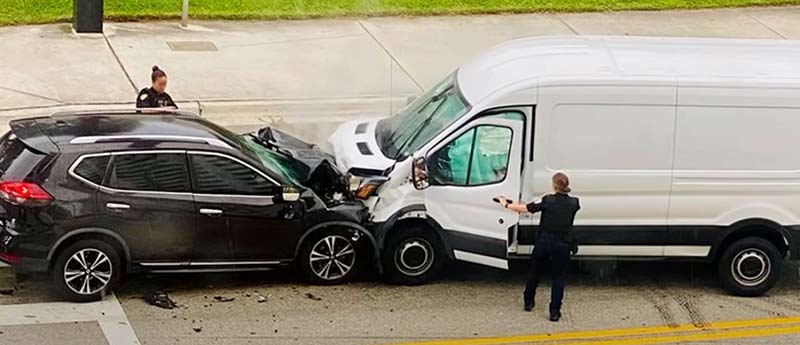
Car accidents are often caused by driver negligence, but when a motorist shows a lack of concern for the safety of others on the road and deliberately engages in dangerous driving practices, the risks increase. Aggressive drivers often cause very serious injuries and immense physical, financial, and emotional losses to others.
Some accidents commonly associated with aggressive driving include:
- Rear-end accidents
- Sideswipe accidents
- T-bone accidents in intersections
- Chain reaction car accidents – or pileups
- Head-on accidents
- Rollovers
No matter what type of collision happens, the resulting injuries can be life-changing for victims.
Reckless Driving in Texas
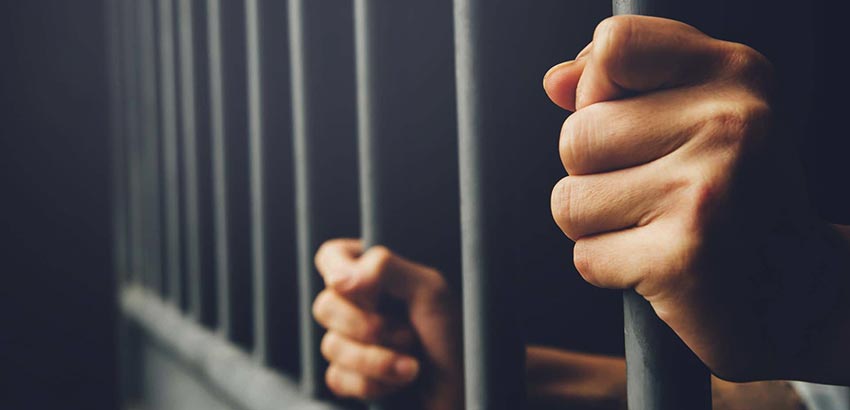
It’s important to note that, in the State of Texas, aggressive driving can result in a misdemeanor charge that carries up to 30 days in jail and fines of up to $200 if it qualifies as reckless driving. Reckless driving is defined as driving a vehicle in a manner that willfully or wantonly disregards the safety of others.
In other words, if the at-fault motorist allowed their aggression to get the better of them behind the wheel, they could be charged with reckless driving, which could bolster your car accident claim.
Proving Aggressive Driving
To prove that the other driver’s aggression was the cause of the accident that left you injured, you’ll need evidence. Your car accident attorney might use the following evidence in an aggressive driving accident claim:
- The police report and any citations or criminal charges, such as for reckless driving, speeding, or tailgating
- Physical evidence gathered at the scene of the accident
- Eyewitness testimony and the photos and videos captured by other drivers and bystanders at the scene
- Footage from dashcams, traffic cameras, or security cameras in the vicinity of the accident
- Accident recreation models by experts that depict how the accident unfolded
- The testimony of professionals with relevant expertise
Your lawyer will know how to build a strong case and present it in the most persuasive manner possible.
Seeking Legal Compensation
In addition to demonstrating that the other driver is responsible for the accident that left you injured, you’ll need to show the extent of your losses – or legal damages.
Common damages claimants may be able to recover compensation for in a personal injury lawsuit can be divided into two categories: economic and non-economic damages. Economic damages are the quantifiable losses a victim has incurred or will incur because of the accident. Non-economic damages refer to the intangible, non-monetary losses the victim experiences because of the accident.

Recoverable Economic Damages
- Property damage
- Rehabilitation or therapy costs
- Rental vehicle costs
- Medical expenses (including future costs)
- Loss of present and future wages
- Lost ability to earn income
- Other accident-related out-of-pocket expenses
Non-Economic Damages
- Pain and suffering
- Loss of consortium
- Mental anguish
- Emotional distress
- Diminished quality of life
- Loss of companionship
- Disabilities and physical impairments
- Permanent scars and disfigurement
Punitive or exemplary damages are occasionally awarded in cases where the at-fault party's actions were found to be especially reckless or negligent. The purpose of punitive damages is to punish the at-fault for their actions and deter others from similar conduct in the future. A car accident lawyer can determine the full extent of your injuries and financial losses by gathering and preserving all necessary evidence to support your case.
Proving the Extent of Your Losses
Proving your claim involves proving both liability and damages to the insurance company. Your attorney might use the following evidence to prove your losses:
- All medical records related to your car accident injuries
- Your doctor’s notes and accounts of your treatment and prognosis
- Your own journal entries of how your life has been affected by the accident, as well as input from those who know you best
- The testimony of expert witnesses in professions relevant to your injuries
- Your medical bills
- Your current pay stubs showing your earnings prior to the accident
Your dedicated car accident attorney will do what it takes to ensure that your complete losses are well accounted for in pursuit of the compensation you deserve. They will negotiate with insurers until you receive a fair offer that covers your past and future losses.
Protecting Your Car Accident Lawsuit
While you’ll look to your car accident attorney to build your strongest claim and handle the claim process, there are steps you can take to help protect your car accident claim, including:
- Don’t wait to seek the medical attention that you need: This is not only the best course of action for your physical recovery but also sends a message to the insurance company that your injuries are as serious as you claim.
- Do follow your medical team’s instructions and advice carefully: which – again – supports an optimal health outcome while demonstrating that you take the matter as seriously as the insurance company should.
- Do retain a respected car accident attorney as soon as you can: The sooner you have professional legal guidance on your side, the better protected your claim will be.
- Do leave all communications with the involved insurance company to your car accident attorney: The insurance company is very motivated to settle for less, and they’re not above twisting your words in the process.
- Don’t post on social media while your claim is pending: Doing so might give the insurance company another opportunity to misinterpret what you have to say. Social media silence is always the best policy in the face of a car accident claim.
- Don’t accept a settlement offer without legal representation: Insurance companies often make quick offers far below what you deserve, hoping you will accept one without knowing you deserve more. Your attorney will review an offer and advise whether it is fair.
Experienced Texas Car Accident Attorneys
The Texas car accident attorneys at Miller Weisbrod Olesky are committed to holding aggressive drivers accountable for their actions and the injuries they cause. For more information about what we can do to help you, please don’t hesitate to contact us online or call us at 888-987-0005 today. Consultations are free, and you pay nothing unless we obtain compensation for you.
Meet The Leader In Car Accident Litigation With A Record Of Multi-Million Dollar Settlements And Verdicts
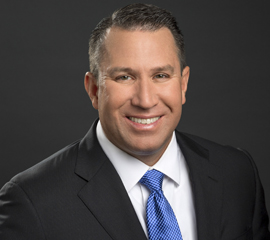
With a 30-year history heading the Car Accident Department of Miller Weisbrod Olesky, firm partner Clay Miller has a proven record of holding negligent parties accountable and achieving multi-million dollar settlements and court verdicts for his clients. Clay has been consistently listed in Super Lawyers as one of the Best Lawyers in Texas, published in Texas Monthly, for over 15 years.
Clay is regularly invited to speak to Trial Lawyer Groups around Houston and across the state of Texas on the topics of motor vehicle accident laws, trial tactics and techniques, and how to prepare evidence and a winning legal strategy in Car Accident Cases throughout Texas. Clay was the featured speaker for the Texas Trial Lawyers Association on the new changes to trucking laws passed by the state of Texas.
Our car accident legal team includes Josh Birmingham, who is currently on the Dallas Trial Lawyers Board of Directors and served as the president of the Mesquite Bar Association for four years. Josh was named Thomson Reuters | Texas Super Lawyers Rising Star in 2016 and 2017.
We also have on our team Michael Orth, a board certified personal injury trial lawyer who has spent the last decade representing injured Texans and their families. Michael’s success in scores of personal injury cases across federal and state courtrooms has earned him the coveted Board Certification in Personal Injury Trial Law by the Texas Board of Legal Specialization.
Led by a formidable legal team with an extraordinary record of court verdicts and settlements in car accident cases, Miller Weisbrod Olesky is regularly recognized by the US News and World Report as one of the top injury law firms in the United States.
Miller Weisbrod Olesky Texas Car Accident Lawyers
Clay Miller

Clay is Board Certified in Personal Injury Trial Law by the Texas Board of Legal Specialization. Clay has practiced solely in the field of catastrophic injury and wrongful death since graduating from law school. His practice has been limited to the representation of victims. Over the past twenty-four years, Clay has successfully settled or tried to verdict cases in the areas of vehicular negligence, medical malpractice, construction site accidents, workplace injury, premises liability, and commercial trucking and a nationwide business loss case (suits filed in a dozen different states) involving defective truck engines sold to trucking companies.
Clay represented dozens of trucking companies in lost profit and diminished value claims against Caterpillar in 2010 through 2012. These cases were filed in over a dozen states with the bellwhether trial set in Federal Court in Davenport, Iowa. After intense litigation and trial preparation, a global confidential settlement was reached for all the clients.
Clay's most recent 2017 victories are a $30,800,000 jury verdict in Tennessee arising from fraud claims in the sale of heavy-duty truck engines and a $26,500,000 jury verdict in a construction accident, obtained within 60 days of each other.
Clay was raised in Lewisville, Texas and completed his undergraduate degree in Finance at
Texas A & M University. Following graduation from Southern Methodist University School of law, Clay worked for two Dallas firms representing victims. In 1998, Clay began his own practice before forming his current partnership. In addition to his law practice, Clay has lectured at seminars and published in the areas of construction accidents, jury selection techniques, medical negligence, trucking accidents and settlement tactics.
He is active in local and statewide trial lawyers' associations including serving as the Chair of the Advocates for the Texas Trial Lawyers' Association in 2002 and remains on the Board of Directors. Clay served as President of the Dallas Trial Lawyers Association from 2008-2009. He has also been a member of the American Board of Trial Advocates (ABOTA) since 2014.
Education
- Southern Methodist University School of Law - Dallas, Texas
- Texas A&M University - Finance - College Station, Texas
Areas of Practice
Associations & Memberships
- State Bar of Texas
- State Bar of New Mexico
- State Bar of Colorado
- American Board of Trial Advocates (ABOTA)
- Texas Trial Lawyers Association
- Dallas Trial Lawyers’ Association
- American Association of Justice
Josh Birmingham

Josh Birmingham was born in Las Cruces, New Mexico and raised in the small oil town of Hobbs, New Mexico. He graduated from the University of Nebraska in 2004 where he was a part of the Big 12 champion baseball team and was a College World Series participant.
He obtained his law degree from the University of Tulsa: College of Law in 2007 where he earned numerous awards in Mock Trial and Negotiation competitions.
Josh began his career at another prominent law firm where he fought for the victims of other’s negligence.
After 9 years Josh left being a trial lawyer and became an executive for a healthcare consulting firm but his passion for helping others in the law quickly pulled him back. Josh has tried numerous cases in both state and federal court. Josh began his first day with Miller Weisbrod Olesky in trial with Clay Miller representing an injured construction worker, Fernando Canales. Josh second chaired the trial and handled all of the medical expert testimony in the case.
Click Here: for complete verdict information
Josh is a member of the State Bar of Texas, American Association of Justice, Texas Trial Lawyers Association, Dallas Trial Lawyers Association, and Dallas Association of Young Lawyers. He is currently on the Dallas Trial Lawyers Board of Directors and served as the president of the Mesquite Bar Association for four years. Josh was named Thomson Reuters | Texas Super Lawyers Rising Star in 2016 and 2017.
Josh accredits his passion toward helping others to his mother Pam Parkinson, a nurse and business woman, and his father Ray Birmingham a college baseball coach.
Education
- University of Nebraska
- University of Tulsa - School of Law
Areas of Practice
Associations & Memberships
- American Association of Justice:
Member
- Texas Trial Lawyers Association:
Member
- Dallas Trial Lawyers Association:
Member
Board of Directors - Dallas Association of Young Lawyers:
Member
- Mesquite Bar Association:
Member
Michael Orth

Michael is a board certified personal injury trial lawyer who has spent the last decade representing injured Texans and their families. Born and raised in Dallas, Michael attended Texas A&M University where he earned a Bachelor of Science in Political Science. Following graduation, Michael worked in sales for one of the largest trucking companies in the United States. While working in the trucking industry, Michael saw the dangers that can and do occur when companies put profits before safety, and safety is not provided its proper place at the table. It was at this point Michael decided to pursue a career in law to help those harmed by the negligence of others.
Michael attended the University of Houston Law Center, where he served as a Senior Articles Editor for the Houston Journal of International Law. Throughout law school, Michael clerked at one of the 5 law firms that represented the State of Texas against Big Tobacco, where he worked on cases ranging from catastrophic crane collapses, to sexual abuse cases to environmental class action lawsuits. Most importantly, Michael learned the law could be used to do a lot of good in peoples’ lives, and could help those who had been injured because of the carelessness of others.
After obtaining his law license, Michael moved to South Padre Island and practiced personal injury law in the Rio Grande Valley. While practicing in South Texas, Michael tried nearly 20 cases in federal and state courtrooms across South Texas, consistently obtaining verdicts significantly higher than the insurance companies’ offers. As a result of his success in the courtroom, Michael is Board Certified in Personal Injury Trial Law by the Texas Board of Legal Specialization, a designation earned by practicing personal injury law almost exclusively, showing substantial success and experience trying personal injury lawsuits, completing extensive Continuing Legal Education in personal injury trial law, and passing a rigorous written exam demonstrating superior competence in handling personal injury cases.
Michael is married to Katlyn and has 2 young daughters, Kathleen and Mary Louise. Michael volunteers for the Dallas Volunteer Attorney Program, providing pro bono legal services to others in the community.
Education
- Texas A & M University
- University of Houston Law Center
Areas of Practice
Associations & Memberships
- American Association of Justice:
Member
- Texas Trial Lawyers Association:
Member


